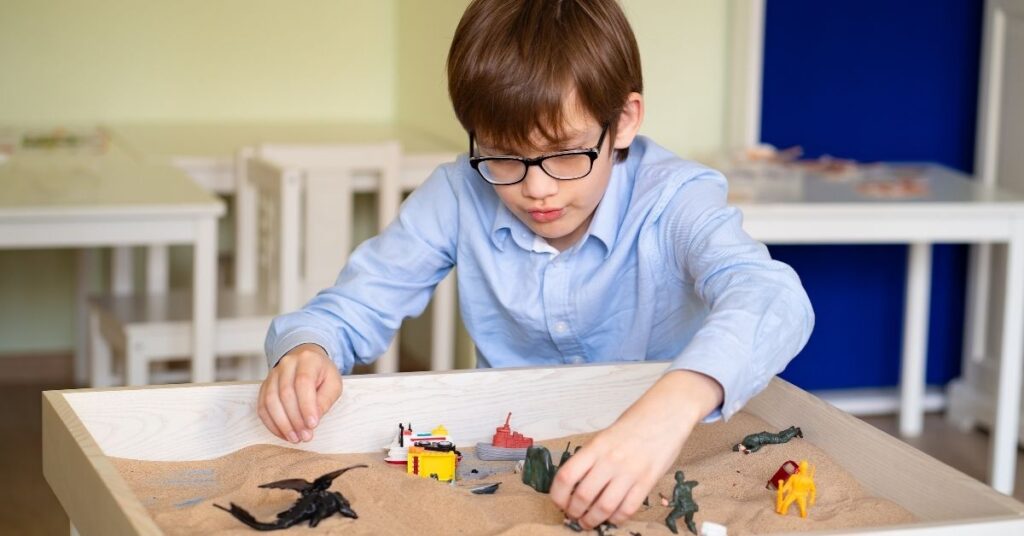As a parent of an autistic child, I’ve certainly felt it. Other people staring at my son and judging us both for his behavior. It happened more when he was younger and would have meltdowns when we needed leave a place or would ignore my instructions. As a teenager, it’s less because his autistic behaviors are more subtle now. Yet, I still feel the stigma of autism – for him and me. So how do we deal with that as parents?
Why is there stigma related to autism?
First, let’s define stigma. Dictionary.com defines stigma as “a mark of disgrace or infamy; a stain or reproach, as on one’s reputation.” Yet, the American Psychological Association dictionary better defines it as “the negative social attitude attached to a characteristic of an individual that may be regarded as a mental, physical, or social deficiency. A stigma implies social disapproval and can lead unfairly to discrimination against and exclusion of the individual.”
How many times has someone said your child “doesn’t look autistic” to you? I have heard it plenty of times about my son J. Even from family members! Yes, it’s true. Most people with autism don’t have a certain look because it is invisible from a physical perspective. The stigma is related to people seeing someone who looks “normal” but doesn’t behave that way.
Autistic children may have traits that can make others feel uncomfortable such as:
- Not making eye contact with others
- Being non-verbal (or constant talking if they are a highly verbal like my son J was as a child)
- Having meltdowns, especially with transitions to new activities
- Making repetitive movements or sounds
- Hand-flapping, spinning or similar behavior when they are excited
How stigma impacts autistic children and parents

Studies have shown that the greater number of autistic behaviors that a child has, the more stigma, isolation and exclusion are felt by the parents and caregivers. Researchers in this study explained how stigma occurs:
- First, a child’s behavior is observed and labeled as different, linking it to negative stereotypes.
- Second, their behavior is rejected, and they are isolated and excluded. They lose social status.
- Third, that can lead to discrimination.
How does autism stigma affect your child and you? It may result in:
- Reduced social connections that lead to feelings of loneliness and rejection
- Negative effect on your and your child’s well-being, causing poorer mental and physical health
- More camouflaging of autistic traits, which can lead to autistic burnout and emotional exhaustion
- Increased stress in parents
- Reduced self-esteem in both autistic children and their parents
What role do autism stereotypes play in stigma?
There have been several studies about autistic stereotypes in the media, in which people with autism are generally portrayed as:
- Patients
- Savants (someone who has special gifts)
- Criminals or dangerous individuals
- Victims
I conducted my capstone research project on this topic for my master’s degree in public relations. It was fascinating to study. My literature review showed the importance of how media – both entertainment and news – play a role in how people with autism are portrayed to those who are not familiar with the condition. Perceptions in a community of those with autism can affect how they are viewed as members of society and affect their ability to interact with other socially, obtain services they need and find and keep jobs.
In other words, the autism stereotypes are real and do impact how people view those with autism.
How do you deal with stigma?
So how can we as parents deal with autism stigma both for ourselves and our children? Here are some ways to help.
1. Reframe autism
You’ve probably seen the memes that say, “Different not less” and quotes from Temple Grandin, Ph.D., who also discusses this view of autism. It’s true – autism is a different way of being wired. When you reframe autism as a mindset, other people’s opinions and views of your child will mean less to you and help you feel less stigma.
Dr. Grandin’s book “Different… Not Less: Inspiring Stories of Achievement and Successful Employment from Adults with Autism, Asperger’s, and ADHD” (affiliate link) is truly inspiring.
2. Educate others about autism
Look for opportunities to explain autism to others and even share credible resources with them. I finally started doing this as my son got older, and I became more confident in my understanding and ability to explain it to others. When I told someone that he has Asperger’s or autism and what that meant, they had a better understanding of my son’s behavior at the moment. They even seemed more open to learning and would ask me questions.
In addition, when J was in fifth grade, the special services director at his school held a learning session on autism for J’s class. She explained what autism is, and then she had J talk about what it was like to have autism. It was a great opportunity to educate his classmates, and they better understood J after that.
3. Be an advocate

If you have a local autism organization, get involved! It can be as simple as sharing their posts from social media channels on your profiles. You can also follow your Arc local chapter and find out how you can support policy decisions that help those with autism and other additional needs in your community. It may be as easy as an email to your state’s legislative representative to request them to support a bill that could benefit those with autism or oppose those that would take away services and rights.
If you have capacity (and I realize many do not, especially when their autistic child is younger), you can volunteer for the organization. As my son J has gotten older (he is now a teenager), I found I do have more time than before. I joined the board of directors for our local Autism Community Connection, and I love advocating on behalf of my son and others who are affected by autism.
Have you taken steps to overcome autism stigma as a parent? If so, what have you found that works for you? Leave a comment so that we can share and encourage one another on this journey.








